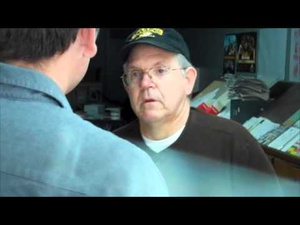This evening’s event with Stephen Quinn causes me to think about a book read some time ago Flat Earth News, by Nick Davies.
While Mr. Quinn is not a newspaper man, he is — first and foremost — a journalist. The book by Mr. Davies is about journalism, and the dearth of it in the papers found principally in London, but not exclusively so. Being a regular writer for The Guardian, his expertise lies in the output of Fleet Street rather than elsewhere, and thus he devotes much of his book to the state of British journalism in its newspapers as well as the BBC News web-site. It’s a fascinating read and highly recommended for people who think.
First, however, let’s have one thing clear from the outset: this is not about how some minority group or secret committee is controlling the world and / or the media. While there may be decisions made about things by groups we know nothing about (that’s why they’re ‘secret groups’ after all), it’s all too easy to shuffle off one’s responsibility for not doing anything to change things by blaming an anonymous ‘powerful individuals’. Here’s an H.L. Menken quote included in the book (p. 395) which goes some way to explain how this sort of thinking can be rubbish:
…the central belief of every moron is that he is the victim of a mysterious conspiracy against his rights and true deserts … [He] ascribes all his failures to get on in the world, all of his congenital incapacity damfoolishness, to the machinations of werewolves assembled in Wall Street or some other such den of infamy.
This book is specifically about how there are few, if any, people in control of the media. While many reporters and editors find all too frequently that they aren’t able to do the fact-checking they wish to — and are frustrated at the situation’s stasis — they aren’t the cause of it through lack of initiative; they simply haven’t the time. According to the staggeringly persuasive argument of author Nick Davies, the newspapers of the UK are essentially now all owned by people who have little interest in publishing newspapers containing journalism. What these individuals are principally concerned with is simply ‘selling copies of the paper each and every day, and the more the better.’ This quantity over quality approach is why they are termed “the Grocers” by Mr. Davies.

Cover art of “Flat Earth News” by Nick Davies
Certainly, any business must be operated with an eye to profit v. loss. However, there is so much an avoidance of idealism towards the media’s content, that the readers are being under-served to the point of unconscionable delivery of falsity on the part of the various persons responsible for the media outlets’ content.
While the book focuses much of its time upon the newspapers of London — including entire chapters each devoted to the Sunday Times, the Observer, and both the Daily and Sunday Mail newspapers–the problems and trends can all be recognized as being world-wide in scope. The newspapers of North America are, thankfully, prevented from out-right lying about individuals in print, owing to a reversal of the onus of proof in legal arguments here, when compared to the UK. That said, the habit of reporting quickly and loudly, then correcting slowly and quietly, is one which no legal or regulatory procedure can effectively prevent.
The other worrisome trend is the one first identified in the book: things being simply repeated from the texts of Media Releases without any effort to confirm that there is any validity within them, or even if they contain amplified — or ‘sexed up’, to use the UK Government’s term about the Iraqi WMD reports — versions of the truth which is then responsible for a snowball effect of panic about the subject in question; which then is fed-back into (EG: Iranian Elections get dropped to cover Michael Jackson’s death) or someone is able to stop the thing by explaining that it’s simply not true in the slightest and we can all relax now (EG: the nullification of the principle of habeas corpus in the USA is only applied to the cases of those naughty terrorists).
The fact that this book doesn’t cover is the recent development of newspapers closing due to financial decisions by their owners, despite any budget restraints they may have imposed prior to the shut-down. It would be fascinating to know what Mr. Davies’ views of the ‘new media platform’ might do to return journalists to the forefront of the delivery of facts. He suggests late in the book that an over-haul of newspapers is required, with the probable method of delivery being some sort of display screen.
Read this book, not to begin seeing some Secret Star-Chamber Cabal controlling the World’s fate, but in order to see that there is an ordinary group of men frantically pulling levers behind the curtain so as to continue making the Great Oz of the Media just as impressive and seemingly required as ever before.
Flat Earth News: An Award-Winning Reporter Exposes Falsehood, Distortion and Propaganda in the Global Media by Nick Davies; PP 420 (including index), ISBN: 978-0-099512-6-84; 2nd Edition published in 2009 by Vintage, an imprint of Random House, London, SW1V













![Reblog this post [with Zemanta]](https://i0.wp.com/img.zemanta.com/reblog_e.png)